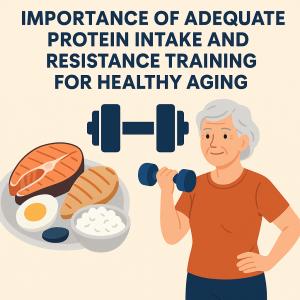
Protein Intake and Resistance Exercise Show Great Promise for Muscle Growth and Improved Health Across All Ages
New research confirms combining dietary protein with resistance training greatly enhances muscle growth, strength and healthy aging across all life stages.
Recent research continues to affirm the critical importance of protein in the muscle-building process. A 2022 systematic review published in the journal Cachexia Sarcopenia Muscle (https://pubmed.ncbi.nlm.nih.gov/35187864/) analyzed 74 randomized controlled trials and concluded that protein supplementation significantly augments muscle mass and strength gains when combined with resistance training. The results were consistent across both young and older adults, men and women, and trained and untrained individuals.
“Resistance exercise provides the mechanical stimulus, while protein supplies the amino acids needed to repair and build muscle tissue,” says Dr. Aaron Michaels, a sports nutrition researcher and contributing author to the review. “Without adequate protein, the full benefits of training cannot be realized.”
How Much Protein Is Optimal?
While the Recommended Dietary Allowance (RDA) for protein is 0.8 grams per kilogram of body weight per day, this baseline is considered insufficient for those engaging in regular resistance training. Multiple studies now recommend 1.6 to 2.2 grams of protein per kilogram of body weight per day to optimize muscle protein synthesis, particularly for individuals aiming to gain lean mass or prevent muscle loss during aging or caloric restriction.
A 2017 position paper by the International Society of Sports Nutrition (https://jissn.biomedcentral.com/articles/10.1186/s12970-017-0177-8) supports this higher intake, emphasizing that evenly distributing protein across 3 to 5 meals throughout the day—each containing 25 to 40 grams of high-quality protein—leads to better muscle protein synthesis than skewed or infrequent intake.
Resistance Exercise: The Essential Partner
Resistance training, including weight lifting, bodyweight exercises, and resistance bands, provides the essential stimulus for muscle adaptation. It activates satellite cells and triggers anabolic signaling pathways like mTOR, setting the stage for protein-fueled muscle repair and growth.
When performed 2 to 4 times per week, resistance training has been shown to produce significant increases in muscle cross-sectional area and strength. It is reported that progressive resistance training can improve muscle mass by 1.4 to 2.5 kg over a 12- to 24-week period, especially when combined with sufficient dietary protein.
Benefits for Older Adults
The aging process naturally leads to sarcopenia, or age-related muscle loss, which contributes to falls, frailty, and decreased quality of life. However, resistance exercise combined with adequate protein intake can counteract this trend. A 2020 study in Nutrients (https://www.mdpi.com/2072-6643/12/8/2285) found that older adults who followed a high-protein diet (1.2 g/kg/day or more) and engaged in resistance training maintained more muscle mass and strength than those who did not.
“Preserving muscle through resistance training and nutrition is key to maintaining independence as we age,” says Dr. Karen Huang, a geriatric nutrition specialist. “It’s not just about aesthetics—it’s about living a longer, healthier, and more functional life.”
What Counts as High-Quality Protein?
High-quality proteins contain all nine essential amino acids in optimal ratios and are easily digestible. Animal sources such as eggs, lean meats, poultry, dairy, and fish are rich in complete proteins. For those following plant-based diets, combinations of legumes, grains, soy, and plant-based protein powders can meet amino acid requirements when consumed thoughtfully.
Leucine, a branched-chain amino acid (BCAA), plays a particularly important role in stimulating muscle protein synthesis. Research recommends 2–3 grams of leucine per meal to trigger this effect, an amount found in roughly 25–30 grams of whey protein or 3–4 ounces of chicken breast.
Practical Tips for Muscle Support
• Consume 25–40g of protein per meal, especially post-exercise and before bed.
• Include resistance training at least 2–3 times weekly with progressive overload.
• Balance your protein sources, favoring whole foods but incorporating supplements as needed.
• Stay hydrated and get adequate sleep, both of which support recovery and growth.
Conclusion
Whether you're an athlete aiming to enhance performance, an adult seeking better health, or a senior striving to preserve strength and mobility, the combination of resistance exercise and appropriate protein intake is a proven, science-backed approach to achieving your goals.
About Metairie Optimal Performance Enhancement/MOPE Clinic
MOPE Clinic is a leader in evidence-based health and wellness education. We provide practical insights grounded in peer-reviewed research to empower individuals to make informed decisions about fitness, nutrition, and long-term wellbeing.
Chris Rue
Metairie Optimal Performance Enhancement
+1 504-265-5491
email us here
Visit us on social media:
LinkedIn
Instagram
Facebook
Distribution channels: Business & Economy, Healthcare & Pharmaceuticals Industry, Military Industry, Science, Sports, Fitness & Recreation
Legal Disclaimer:
EIN Presswire provides this news content "as is" without warranty of any kind. We do not accept any responsibility or liability for the accuracy, content, images, videos, licenses, completeness, legality, or reliability of the information contained in this article. If you have any complaints or copyright issues related to this article, kindly contact the author above.
Submit your press release

